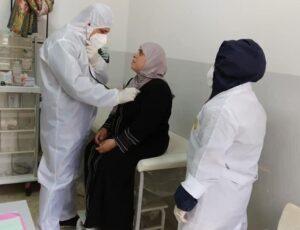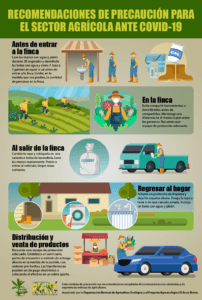Webinar Discusses Root Causes, COVID-19 Responses and Next Steps for Social Movements
On May 14 over 110 Grassroots International supporters and activists joined a Zoom call to learn more about how social movements are organizing during the COVID-19 pandemic and beyond. The webinar entitled “COVID-19: Global Solidarity Across Movements” featured Dr. Mustafa Barghouti (founder of the Palestinian Medical Relief Society), Katia Avilés-Vázquez (a member of La Jornada Se Acabaron Las Promesas and Organización Boricuá de Agricultura Ecológica), and Trina Jackson (Building Equity and Alignment for Impact Fund Director for Grassroots International). The full recording of the webinar can be found at the bottom of this blog.
Root Causes and Historical Framework Leading up to the Pandemic
The COVID-19 crisis has exacerbated existing inequities around the world, reinforced by violence. To illustrate the long history of oppression, each speaker began with examples of some of the underlying issues their communities have been dealing with.
Mustafa started his presentation by letting the group know that he was speaking on the eve of the 72nd anniversary of the Nakba — the day when more than 700,000 Palestinians were expelled from their lands and have yet to return. He talked about how Palestinians are suffering another epidemic that was produced by the US government — Trump’s “deal of the century” that will annex even more Palestinian land, will create an apartheid nation-state based in racial discrimination against Palestinians, and will deny the Right of Return of Palestinians to their lands.
We are all chained by the weight of the past. –Katia Avilés-Vázquez
Katia spoke of how colonization of Puerto Rico transformed the economy from a small-scale, agrarian economy to an industrial, capitalistic model that devalued farmers and thrived on the exploitation of women, bodies, and land for industrial agriculture. One shocking statistic — in 1938 Puerto Rico produced 68% of its own food and by 2010 it had dropped to less than 20% — demonstrates how these policies have created a cycle of dependence in one generation. In 2016, the Puerto Rico Oversight, Management, and Economic Stability Act (PROMESA) led to extreme austerity measures that weakened Puerto Rico’s infrastructure from the electrical grid, to health care, to education. When Hurricanes Irma and Maria decimated Puerto Rico, the US hand-picked the board overseeing recovery efforts, who, in turn, began privatizing and selling off land to finance recovery efforts. The board was also rife with corruption and scandals that led to mass protests in 2019 which caused the impeachment of Puerto Rico’s governor.
State violence is more than just a single event. It’s an ongoing condition of our lives. –Trina Jackson
Trina spoke of the long history of racism and white supremacy that has plagued the communities of color and Indigenous communities in the US. She spoke of Ibrahim X. Kendi’s concepts of the freedom to versus the freedom from that began during the abolishment of slavery and continues to this day. When slavery was abolished, slave owners claimed their freedom to own slaves was threatened — today that is translated into whites claiming that their freedom to get haircuts, eat at a restaurant, and possibly infect others is being threatened. In the same respect, slaves upheld their freedom from being owned, sold, and treated as property when slavery was abolished — and today communities of color are demanding their freedom from being exposed to and infected by COVID-19 that is disproportionately impacting their communities. This cycle of freedom to and freedom from can also be seen in environmental justice communities where polluting industries claim their freedom to operate versus communities of color’s and low-income communities’ freedom from being exposed to dangerous pollutants.
Social Movement Responses to COVID-19
We have seen time and time again the important role that social movements and community organizing play in addressing root causes and mitigating emergencies. For decades, social movements have been picking up the slack where governments and their policies have failed to provide for their citizens. From creating co-ops, to reclaiming land, to building critical infrastructures like roads, schools, and health clinics — social movements have cut through the red-tape and bureaucracy to build community-controlled space everyone benefits from.
 Mustafa spoke of the effective collaboration between the Palestinian Ministry of Health and civil society controlling the spread of COVID-19. While Palestine only had access to 43,000 tests, Israel administered 480,000. In stark contrast, the West Bank and Gaza only had 343 fatalities, while Israel reported 4,000 deaths from COVID-19. Groups like the Palestinian Medical Relief Society (PMRS) have been organizing and serving communities long before the pandemic had deep relationships and trust within the community and used them to stop the spread of the deadly disease. PMRS distributed more than 550,000 pamphlets on COVID-19 prevention. Fifty of their community clinics remained open while other health agencies shut down, providing vital continuing care to chronically ill patients and maternal care and vaccinations for children, who would have otherwise been left without any access to health care. They had eight mobile clinics that provided 110 Bedouin nomadic communities with care as well.
Mustafa spoke of the effective collaboration between the Palestinian Ministry of Health and civil society controlling the spread of COVID-19. While Palestine only had access to 43,000 tests, Israel administered 480,000. In stark contrast, the West Bank and Gaza only had 343 fatalities, while Israel reported 4,000 deaths from COVID-19. Groups like the Palestinian Medical Relief Society (PMRS) have been organizing and serving communities long before the pandemic had deep relationships and trust within the community and used them to stop the spread of the deadly disease. PMRS distributed more than 550,000 pamphlets on COVID-19 prevention. Fifty of their community clinics remained open while other health agencies shut down, providing vital continuing care to chronically ill patients and maternal care and vaccinations for children, who would have otherwise been left without any access to health care. They had eight mobile clinics that provided 110 Bedouin nomadic communities with care as well.
 Communities in Puerto Rico faced different challenges. Hunger has been exacerbated because of the pandemic, yet those who can provide food are being criminalized. Katia told stories of how farmers and food organizers have been stopped, fined, and even arrested for not staying home while they are trying to work their fields and distribute food. Communities are unable to depend on the corrupt government, so movements like Organización Boricuá de Agricultura Ecológica have been connecting farmers to each other and with public health experts. They created infographics and did lots of online organizing sharing resources so farmers can keep selling their food safely. The mutual aid networks that groups like La Jornada Se Acabaron Las Promesas created in the wake of Hurricane Maria provided vital personal protective equipment to farmers and created networks to feed hungry communities.
Communities in Puerto Rico faced different challenges. Hunger has been exacerbated because of the pandemic, yet those who can provide food are being criminalized. Katia told stories of how farmers and food organizers have been stopped, fined, and even arrested for not staying home while they are trying to work their fields and distribute food. Communities are unable to depend on the corrupt government, so movements like Organización Boricuá de Agricultura Ecológica have been connecting farmers to each other and with public health experts. They created infographics and did lots of online organizing sharing resources so farmers can keep selling their food safely. The mutual aid networks that groups like La Jornada Se Acabaron Las Promesas created in the wake of Hurricane Maria provided vital personal protective equipment to farmers and created networks to feed hungry communities.
Next Steps and Supporting the Movements
It was amazing to hear what movements have been able to accomplish during the pandemic, but there’s so much more work to be done to right all of the structural “isms” — racism, imperialism, colonialism, sexism, genderism…
While PMRS was able to restrict COVID-19 cases to 548 in Palestine, they face a new challenge. The pandemic has shifted financial support from other countries away from Palestine. Mustafa said that up to 15 of their clinics are at risk of being shut down. After August, six to eight of the mobile clinics they operate won’t have any funding. They will also need to navigate all the changes coming with Trump’s “deal of the century” as it’s implemented over the summer.
“Fighting for our land, is fighting for our lives,” said Katia when speaking about the work that still needs to be done. She called on activists in the US to call for the cancellation of Puerto Rico’s crippling debt and overturning PROMESA because Puerto Ricans don’t have a voice in Congress. They also hope to create connections with other movements in the Caribbean to build a broader regional coalition for self-determination.
What we need after COVID-19 is a world social movement that can connect people with progressive, humanistic ideas and connect them to each other. –Dr. Mustafa Barghouti
This quote also speaks to Grassroots’ strong belief that those most affected know best what the problems they are facing are and have the most innovative solutions. The problem is they are struggling with the financial resources needed to make these solutions a reality — that’s where solidarity philanthropy comes into play. As a funder in the US, Grassroots International is uniquely poised to connect donor-activists in the US with these movements creating change around the world. Together, we are able to mobilize financial resources to fuel these movements. One way to support the movements in Palestine, Puerto Rico, and beyond during the COVID-19 pandemic is to make a donation to our emergency fund. A donation today will provide critical support to keep clinics open in Palestine, to organize to reclaim land in Puerto Rico, and so much more.
